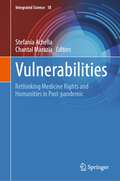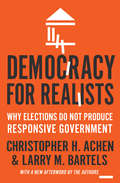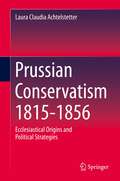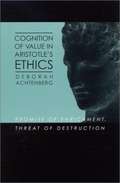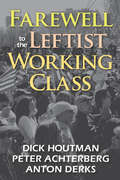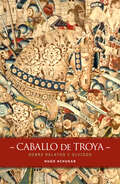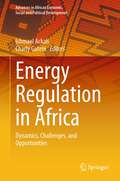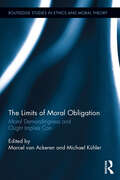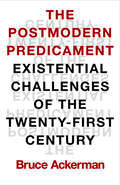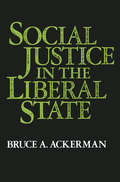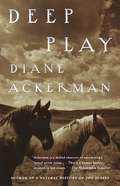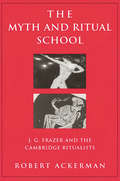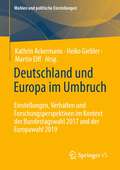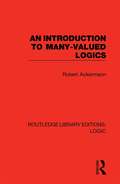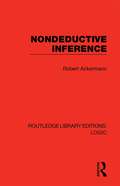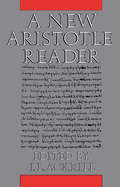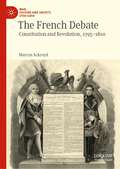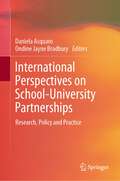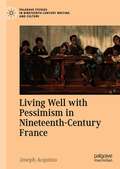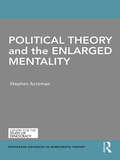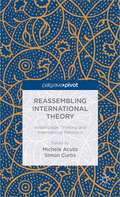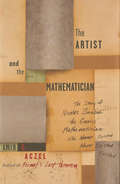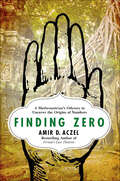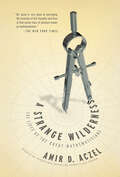- Table View
- List View
Vulnerabilities: Rethinking Medicine Rights and Humanities in Post-pandemic (Integrated Science #18)
by Stefania Achella Chantal MaraziaDrawing from a wide array of disciplinary perspectives and geographical contexts, this volume offers new insights for critically engaging with the problem of vulnerability. The essays here contained take the move from the COVID-19 pandemic, in order to explore the inherent vulnerability of individuals, but also of social, economic and political systems, and probe the descriptive and prescriptive import of the concept.Each chapter provides a self-contained perspective on vulnerability, as well as a specific methodological framework for questioning its meaning. Taken together, the chapters combine into a multi-disciplinary toolkit for approaching the various forms and structures of vulnerability, with a special attention to the intersectional factors shaping the individual experience of it: from gender to age, from disability to mental illness, from hospitalisation to incarceration. The book explores the theoretical richness and complexity of the concept and proposes new analytical approaches to it, before illustrating its multifariousness through empirically grounded case studies. The closing section engages with “the future of vulnerability”, as a hermeneutic, epistemological, and critical-normative perspective to be deployed beyond the domain of global crises and emergencies.The volume is primarily intended as a reference for scholars in the human, social and health sciences. The accessible structure and plain language of the chapters make it also a valuable didactic resource for graduate courses in philosophy, the social sciences and public health.
Democracy for Realists: Why Elections Do Not Produce Responsive Government
by Christopher H. Achen Larry M. BartelsDemocracy for Realists assails the romantic folk-theory at the heart of contemporary thinking about democratic politics and government, and offers a provocative alternative view grounded in the actual human nature of democratic citizens.Christopher Achen and Larry Bartels deploy a wealth of social-scientific evidence, including ingenious original analyses of topics ranging from abortion politics and budget deficits to the Great Depression and shark attacks, to show that the familiar ideal of thoughtful citizens steering the ship of state from the voting booth is fundamentally misguided. They demonstrate that voters—even those who are well informed and politically engaged—mostly choose parties and candidates on the basis of social identities and partisan loyalties, not political issues. They also show that voters adjust their policy views and even their perceptions of basic matters of fact to match those loyalties. When parties are roughly evenly matched, elections often turn on irrelevant or misleading considerations such as economic spurts or downturns beyond the incumbents' control; the outcomes are essentially random. Thus, voters do not control the course of public policy, even indirectly.Achen and Bartels argue that democratic theory needs to be founded on identity groups and political parties, not on the preferences of individual voters. Now with new analysis of the 2016 elections, Democracy for Realists provides a powerful challenge to conventional thinking, pointing the way toward a fundamentally different understanding of the realities and potential of democratic government.
Literature, Ethics, and Aesthetics
by Sabrina AchillesA conceptualization of the literary aesthetic for a concern for the Self. Bringing Gilles Deleuze and Felix Guattari's constructivist thinking into a practical domain, Sabrina Achilles rethinks the ways in which literature is understood and taught.
Prussian Conservatism 1815-1856: Ecclesiastical Origins and Political Strategies
by Laura Claudia AchtelstetterThe book examines the nexus between political and religious thought within the Prussian old conservative milieu. It presents early-nineteenth-century Prussian conservatism as a phenomenon connected to a specific generation of young Prussians. The book introduces the ecclesial-political ‘party of the Evangelische Kirchenzeitung’ (EKZ), a religious party within the Prussian state church, as the origins of Prussia’s conservative party post-1848. It traces the roots of the EKZ party back to the experiences of the Napoleonic Wars (1806-15) and the social movements dominant at that time. Additionally, the book analyses this generation’s increasing politicization and presents the German revolution of 1848 and the foundation of Prussia’s first conservative party as the result of a decade-long struggle for a religiously-motivated ideal of church, state, and society. The overall shift from church politics to state politics is key to understanding conservative policy post-1848. Consequently, this book shows how conservatives aimed to maintain Prussia’s character as a Christian and monarchical state, while at the same time adapting to contemporary political and social circumstances. Therefore, the book is a must-read for researchers, scholars, and students of Political Science and History interested in a better understanding of the origins and the evolution of Prussian conservatism, as well as the history of political thought.
Cognition of Value in Aristotle's Ethics: Promise of Enrichment, Threat of Destruction
by Deborah AchtenbergArguing that metaphysics is central to ethics for Aristotle, Achetenberg (philosophy, U. of Nevada, Reno) uses a variety of strategies including textual interpretation as well as broader types of interpretation--elucidation of terms and their meanings in English, examination of a variety of texts from ancient Greek thought, and comparison of Aristotle's views with those of other philosophers and thinkers of different types. Annotation copyrighted by Book News, Inc.
Farewell to the Leftist Working Class
by Peter AchterbergSocial conflicts and voting patterns in Western nations indicate a gradual erosion of working-class support for the left, a process that class theory itself cannot adequately explain. Farewell to the Leftist Working Class aims to fill this gap by developing, testing, and confirming an alternative explanation of rightist tendencies among the underprivileged. The authors argue that cultural issues revolving around individual liberty and maintenance of social order have become much more significant since World War II.The obligation to work and strict notions of deservingness have become central to the debate about the welfare state. Indeed, although economic egalitarianism is more typically found among the working class, it is only firmly connected to a universalistic and inclusionary progressive political ideology among the middle class.Farewell to the Leftist Working Class reports cutting-edge research into the withering away of working-class support for the left and the welfare state, drawing mostly on survey data collected in Western Europe, the United States, and other Western countries.
Caballo de troya: Sobre relatos y olvidos
by Hugo AchugarUn conjunto de ensayos que defienden el derecho de las voces silenciadas a sobrevivir por encima del relato hegemónico Toda cultura es un campo de batalla. Allí se dirimen cuestiones que trascienden fronteras estéticas, políticas y territoriales. Cualquier decisión en torno a ella está teñida por una distinción ideológica, construye narrativas, hace oír algunas voces y silencia otras.Hugo Achugar no elude el desafío de mirar más allá de lo aparente. Con su particular estilo escritural, que combina el oficio de poeta con la perspectiva del investigador, el docente y el intelectual, invita al lector a un recorrido que cuestiona y desafía. En estos ensayos dialoga, propone y se opone a un relato que se presenta como hegemónico detrás de la aparente pluralidad, toma posición y se compromete con una mirada cultural que incorpore y asimile la diversidad.¿Cómo se establece el relato hegemónico? ¿Con qué criterios se decide la construcción de la memoria? ¿Son las nuevas tecnologías una herramienta para el cambio o llegaron para sostener el status quo? En tiempos de redes, inteligencia artificial y descrédito hacia todo lo humano, este conjunto de ensayos es una invitación a la reflexión y a la búsqueda de posibles horizontes
Energy Regulation in Africa: Dynamics, Challenges, and Opportunities (Advances in African Economic, Social and Political Development)
by Ishmael Ackah Charly GateteThis book analyzes the political economy governing energy regulation across the African continent. Presenting case studies that span diverse energy sectors and countries, it provides an overview of their complex political and regulatory frameworks. The book explores emerging technologies and energy markets, highlighting Africa’s preparedness for the energy transition, and sheds light on the pivotal role of cross-border energy trade with regard to energy access. Further, it examines regulators’ influence within regional power pools, as well as their contribution to gender mainstreaming in the energy sector, addressing vital social issues. This book is divided into five parts, the first of which focuses on the political economy of energy regulation. The second part discusses emerging technologies and climate change issues, while the third examines regional energy markets, and regional institutional collaboration. The fourth part features contributions on gender mainstreaming, while part five rounds up the coverage. The book will be of interest to policymakers and investors in Africa, as well as scholars interested in energy regulation and economics.
The Limits of Moral Obligation: Moral Demandingness and Ought Implies Can (Routledge Studies in Ethics and Moral Theory)
by Marcel Van Ackeren Michael KühlerThis volume responds to the growing interest in finding explanations for why moral claims may lose their validity based on what they ask of their addressees. Two main ideas relate to that question: the moral demandingness objection and the principle "ought implies can." Though both of these ideas can be understood to provide an answer to the same question, they have usually been discussed separately in the philosophical literature. The aim of this collection is to provide a focused and comprehensive discussion of these two ideas and the ways in which they relate to one another, and to take a closer look at the consequences for the limits of moral normativity in general. Chapters engage with contemporary discussions surrounding "ought implies can" as well as current debates on moral demandingness, and argue that applying the moral demandingness objection to the entire range of normative ethical theories also calls for an analysis of its (metaethical) presuppositions. The contributions to this volume are at the leading edge of ethical theory, and have implications for moral theorists, philosophers of action, and those working in metaethics, theoretical ethics and applied ethics.
The Postmodern Predicament: Existential Challenges of the Twenty-First Century
by Bruce AckermanOne of our most influential political theorists offers a boundary-breaking—and liberating—perspective on the meaning of life in the internet age Human beings have taken one thing for granted since our earliest days: we are bodily creatures dealing with one another on a face-to-face basis. The internet has shattered this fundamental feature of human existence. We are suddenly living our lives in two worlds at once—shifting endlessly from virtual to physical reality as we reach out to others. Worse yet, we are developing different personal identities in our two worlds. We say and do things in virtual reality that flatly contradict our face-to-face commitments to family, friends, and fellow-workers—and vice versa. The Postmodern Predicament explores these dilemmas at each phase of the life cycle, beginning at the moment a young child picks up a cell phone. The existentialist tradition of the twentieth century provides a precious perspective on our postmodern dilemmas. Thinkers and doers like Simone de Beauvoir and Jean-Paul Sartre considered the fragmentation of modern life as a central source of contemporary anxieties. Like them, Ackerman views the challenges of the internet age as a political, no less than personal, problem—and proposes concrete reforms that that could mobilize broad-based support for democracy against demagogic assaults on its very foundations.
Social Justice in the Liberal State
by Bruce AckermanCertain to become the most important work in political theory since John Rawls's A Theory of Justice, this book presents a brilliantly original, compelling vision of a just society-a world in which each of us may live his own life in his own way without denying the same right to others. Full of provocative discussions of issues ranging from education to abortion, it makes fascinating reading for anyone concerned with the future of the liberal democratic state.
Deep Play
by Diane AckermanWith A Natural History of the Senses, Diane Ackerman let her free-ranging intellect loose on the natural world. Now in Deep Play she tackles the realm of creativity, by exploring one of the most essential aspects of our characters: the ability to play. "Deep Play" is that more intensified form of play that puts us in a rapturous mood and awakens the most creative, sentient, and joyful aspects of our inner selves. As Ackerman ranges over a panoply of artistic, spiritual, and athletic activities, from spiritual rapture through extreme sports, we gain a greater sense of what it means to be "in the moment" and totally, transcendentally human. Keenly perceived and written with poetic exuberance, Deep Play enlightens us by revealing the manifold ways we can enhance our lives.From the Trade Paperback edition.
The Myth and Ritual School: J.G. Frazer and the Cambridge Ritualists (Theorists of Myth)
by Robert AckermanFirst Published in 2002. Routledge is an imprint of Taylor & Francis, an informa company.
Deutschland und Europa im Umbruch: Einstellungen, Verhalten und Forschungsperspektiven im Kontext der Bundestagswahl 2017 und der Europawahl 2019 (Wahlen und politische Einstellungen)
by Kathrin Ackermann Heiko Giebler Martin ElffUmbrüche und Krisen führen zu drastischen Veränderungen und bedingen Wandel – nicht zuletzt mit Blick auf politische Einstellungen und politisches Verhalten sowie den politischen Wettbewerb. Mit einem Schwerpunkt auf die Bundestagswahl 2017 und die Europawahl 2019 analysieren die Beiträge in diesem Band das Wahlverhalten in Deutschland und Europa vor dem Hintergrund dieser politischen und gesellschaftlichen Veränderungen.
An Introduction to Many-valued Logics (Routledge Library Editions: Logic)
by Robert AckermannOriginally published in 1967. An introduction to the literature of nonstandard logic, in particular to those nonstandard logics known as many-valued logics. Part I expounds and discusses implicational calculi, modal logics and many-valued logics and their associated calculi. Part II considers the detailed development of various many-valued calculi, and some of the important metathereoms which have been proved for them. Applications of the calculi to problems in the philosophy are also surveyed. This work combines criticism with exposition to form a comprehensive but concise survey of the field.
Nondeductive Inference (Routledge Library Editions: Logic)
by Robert AckermannOriginally published in 1966. An introduction to current studies of kinds of inference in which validity cannot be determined by ordinary deductive models. In particular, inductive inference, predictive inference, statistical inference, and decision making are examined in some detail. The last chapter discusses the relationship of these forms of inference to philosophical notions of rationality. Special features of the monograph include a discussion of the legitimacy of various criteria for successful predictive inference, the development of an intuitive model which exhibits the difficulties of choosing probability measures over infinite sets, and a comparison of rival views on the foundations of probability in terms of the amount of information which the members of these schools believe suitable for fruitful formalization. The bibliographies include articles by statisticians accessible to students of symbolic logic.
A New Aristotle Reader
by J. L. AckrillIn a single volume that will be of service to philosophy students of all levels and to their teachers, this reader provides modern, accurate translations of the texts necessary for a careful study of most aspects of Aristotle's philosophy. In selecting the texts Professor J. L. Ackrill has drawn on his broad experience of teaching graduate classes, and his choice reflects issues of current philosophical interest as well as the perennial themes. Only recent translations which achieve a high level of accuracy have been chosen; the aim is to place the Greekless reader, as nearly as possible, in the position of a reader of Greek. As an aid to study, Professor Ackrill supplies a valuable guide to the key topics covered. The guide gives references to the works or passages contained in the reader, and indication of their interrelations, and current bibliography.
The French Debate: Constitution and Revolution, 1795–1800 (War, Culture and Society, 1750 –1850)
by Marcus AckroydThis book explores the creation and career of the French Constitution of 1795, operative from the start of the Directory until Napoleon’s takeover in 1799. It explores the composition, history and replacement of the French Revolution’s third Constitution through a focus on the speeches and writings of four sets of political voices discernible in late 1790s France. The four main chapters present these voices as Thermidorians, Conservatives, Republicans and Brumairiens. They reveal the intensity and breadth of the debates generated by the permanent tension between the Constitution and the many ongoing conflicts of the Revolution. Set within and beyond the government and the two legislative chambers, the debates feature numerous conflicts central to the French Revolution including the composition and functions of the public powers, the legitimacy of exceptional laws, the regulation of the press and freedom of religion. This sustained focus on the relationship between the political nation and the Constitution provides a fresh reading of the political culture of the Directory.
International Perspectives on School-University Partnerships: Research, Policy and Practice
by Daniela Acquaro Ondine Jayne BradburyThis book draws together international scholarship on school–university partnerships challenging thinking about purpose and sustainability as well as the power of collaboration in transcending organisational and contextual boundaries. Moving beyond transactional arrangements, the book showcase various models of school–university partnerships, and explores the role of policy, research, and practice, across the life cycle of partnerships. This edited collection presents a strong body of evidence with global significance, providing valuable insights into catalysts for partnerships, the drivers for transformational change, and generative growth resulting from authentic collaboration. An important reference for all teacher education providers, schools, and educational stakeholders, this book showcases global examples of the power of partnerships in an era necessitating cross sectoral collaboration to address contemporary societal challenges.
Living Well with Pessimism in Nineteenth-Century France (Palgrave Studies in Nineteenth-Century Writing and Culture)
by Joseph AcquistoThis book traces the emergence of modern pessimism in nineteenth-century France and examines its aesthetic, epistemological, ethical, and political implications. It explores how, since pessimism as a worldview is not empirically verifiable, writers on pessimism shift the discussion to verisimilitude, opening up rich territory for cross-fertilization between philosophy and literature. The book traces debates on pessimism in the nineteenth century among French nonfiction writers who either lauded its promotion of compassion or condemned it for being a sick and unliveable attempt at renunciation. It then examines the way novelists and poets take up and transform these questions by portraying characters in lived situations that serve as testing grounds for the merits or limitations of pessimism. The debate on pessimism that emerged in the nineteenth century is still very much with us, and this book offers an interhistorical argument for embracing pessimism as a way of living well in the world, aesthetically, ethically, and politically.
Political Theory and the Enlarged Mentality (Routledge Advances in Democratic Theory)
by Stephen AcremanIn this book, Stephen Acreman follows the development and reception of a hitherto under-analyzed concept central to modern and postmodern political theory: the Kantian ein erweiterte Denkungsart, or enlarged mentality. While the enlarged mentality plays a major role in a number of key texts underpinning contemporary democratic theory, including works by Arendt, Gadamer, Habermas, and Lyotard, this is the first in-depth study of the concept encompassing and bringing together its full range of expressions. A number of attempts to place the enlarged mentality at the service of particular ideals–the politics of empathy, of consensus, of agonistic contest, or of moral righteousness–are challenged and redirected. In its exploration of the enlarged mentality, the book asks what it means to assume a properly political stance, and, in giving as the answer ‘facing reality together’, it uncovers a political theory attentive to the facts and events that concern us, and uniquely well suited to the ecological politics of our time.
Reassembling International Theory: Assemblage Thinking and International Relations
by Michele Acuto Simon CurtisWhat can 'assemblage' thinking contribute to the study of international relations theory? This study seeks to investigate how the various debates on assemblages in social theory can contribute to generating critical considerations on the connections and dissociation of political agency, physical world and international dynamics.
The Artist and the Mathematician
by Amir AczelNicolas Bourbaki, whose mathematical publications began to appear in the late 1930s and continued to be published through most of the twentieth century, was a direct product as well as a major force behind an important revolution that took place in the early decades of the twentieth century that completely changed Western culture. Pure mathematics, the area of Bourbaki's work, seems on the surface to be an abstract field of human study with no direct connection with the real world. In reality, however, it is closely intertwined with the general culture that surrounds it. Major developments in mathematics have often followed important trends in popular culture; developments in mathematics have acted as harbingers of change in the surrounding human culture. The seeds of change, the beginnings of the revolution that swept the Western world in the early decades of the twentieth century -- both in mathematics and in other areas -- were sown late in the previous century. This is the story both of Bourbaki and the world that created him in that time. It is the story of an elaborate intellectual joke -- because Bourbaki, one of the foremost mathematicians of his day -- never existed.
Finding Zero: A Mathematician's Odyssey to Uncover the Origins of Numbers
by Amir D. AczelThe invention of numerals is perhaps the greatest abstraction the human mind has ever created. Virtually everything in our lives is digital, numerical, or quantified. The story of how and where we got these numerals, which we so depend on, has for thousands of years been shrouded in mystery. Finding Zero is an adventure filled saga of Amir Aczel's lifelong obsession: to find the original sources of our numerals. Aczel has doggedly crisscrossed the ancient world, scouring dusty, moldy texts, cross examining so-called scholars who offered wildly differing sets of facts, and ultimately penetrating deep into a Cambodian jungle to find a definitive proof. Here, he takes the reader along for the ride. The history begins with the early Babylonian cuneiform numbers, followed by the later Greek and Roman letter numerals. Then Aczel asks the key question: where do the numbers we use today, the so-called Hindu-Arabic numerals, come from? It is this search that leads him to explore uncharted territory, to go on a grand quest into India, Thailand, Laos, Vietnam, and ultimately into the wilds of Cambodia. There he is blown away to find the earliest zero—the keystone of our entire system of numbers—on a crumbling, vine-covered wall of a seventh-century temple adorned with eaten-away erotic sculptures. While on this odyssey, Aczel meets a host of fascinating characters: academics in search of truth, jungle trekkers looking for adventure, surprisingly honest politicians, shameless smugglers, and treacherous archaeological thieves—who finally reveal where our numbers come from.
A Strange Wilderness: The Lives of the Great Mathematicians
by Amir D. AczelThe international bestselling author of Fermat&’s Last Theorem explores the eccentric lives of history&’s foremost mathematicians. From Archimedes&’s eureka moment to Alexander Grothendieck&’s seclusion in the Pyrenees, bestselling author Amir Aczel selects the most compelling stories in the history of mathematics, creating a colorful narrative that explores the quirky personalities behind some of the most groundbreaking, influential, and enduring theorems. Alongside revolutionary innovations are incredible tales of duels, battlefield heroism, flamboyant arrogance, pranks, secret societies, imprisonment, feuds, and theft—as well as some costly errors of judgment that prove genius doesn&’t equal street smarts. Aczel&’s colorful and enlightening profiles offer readers a newfound appreciation for the tenacity, complexity, eccentricity, and brilliance of our greatest mathematicians.
